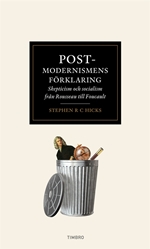“I would never let someone go off to university without this book.”
 Just before the official release of the Swedish translation of Explaining Postmodernism, an editorial review in Dagens Nyheter, Stockholm’s largest newspaper. A rough Google Translate version follows.
Just before the official release of the Swedish translation of Explaining Postmodernism, an editorial review in Dagens Nyheter, Stockholm’s largest newspaper. A rough Google Translate version follows.
Truth is more than just stories
Susanna Birgersson, Editor
[Published March 30, 2014 ]
IN A PREFACE TO the new Swedish-published book “Postmodernism Explained: Skepticism and Socialism from Rousseau to Foucault” by Stephen RC Hicks, Peter Santesson writes: “Modern thinking laid the foundations for the open society. Why would the impact of giving up that thinking be less dramatic?”
Modern thinking is based on the premise that the mind can tell us something about reality outside the mind. Confidence in reason is the prerequisite of the Enlightenment foundations of science and the mother of individualism; its consequences are technological and medical advances, individual rights, and liberal democracy.
Hicks takes us on a winding journey, all the way back to the crime scene and toward contemporary postmodernist theories and policies. 
1700s philosopher Immanuel Kant is the villain, at least according to Hicks. In contrast to the Enlightenment fathers, Kant argued there were too many filters and individual experiences between reason and reality for man to reach objective knowledge by perception and thinking. He liked the mind, but did not think it was capable of something more than indulging itself. Humans may have meticulous organization inside their reason, but of the reality outside they cannot say anything.
What followed was the beginning of an effective dismantling of the ethics of individualism and the Enlightenment view of human beings with their right to self-determination.
And so Hegel’s totally bizarre use of common sense notion. Can we even know oneself? The idea of theses followed by antitheses which empties into the syntheses—something blissfully covering both the opposing statements and no further—is incomprehensible. Graphed dialectics is certainly stylish. Possibly it is a fruitful way to frame the paradoxes found in the Christian faith, a description of the meeting between the immanent and the transcendent. But as a guide to the knowledge of the worldly journey, Hegel is hardly someone to hold your hand.
Hicks turns to collectivism and socialism, in the journey towards the final defeat of reason in postmodernism—in the postwar period this gas seeped into the education system, the human sciences, and politics.
The Enlightenment premise is that the mind can give us knowledge of the real world. But a proper defense of it is still missing, so this basic assumption is the Enlightenment’s Achilles heel—and that’s the stance that postmodernists kick.
The truth about something does not exist, just different stories and experiences—argue the postmodernists. The challenge is then through deconstruction and unmasking to reveal the racism, sexism and colonialism that the white, Western, heterosexual man engaged in. The consequence is that minorities’ struggle issues get huge proportions while the vilest human suffering can be reduced and relativized if it only occurs in non-Western contexts.
that the white, Western, heterosexual man engaged in. The consequence is that minorities’ struggle issues get huge proportions while the vilest human suffering can be reduced and relativized if it only occurs in non-Western contexts.
There is no truth to be grasped and presented. Language and beliefs hide nothing except more language and more social constructions. The function of language is not to be as precise as possible to describe reality—we can never talk about the same thing. Instead, the aim of language is to create “reality”. Anyone who calls his opponents “fascist” is not necessarily speaking “truth” but only using language effectively.
Like Peter Santesson, I would never let a student go off to university without a copy of “Postmodernism Explained”.
Susanna Birgersson
susanna.birgersson @ dn.se
[Thanks to Adam Cwejman and Erik Herbertson for the link. Visit the Explaining Postmodernism page.]
Wow…wonderful.
Last year a liberal friend (in the modern newspeak sense) with whom I had engaged in vigorous sparring in the past read EP on my urging. He called it “a remarkable book”, said he recognized the postmodern residues in his own thought and had to firmly side with the Enlightenment tradition.
Glad to hear that anecdote, Ed.
“Consider that a very small gang of incredibly stupid, shallow, and deranged white trash French professors languishing in the Quartier Latin district of Paris was able to turn and twist the minds of intellectuals into believing that the world is a “discourse” or a “story” that can be told and analyzed more or less in literary terms and that “reality” (the stuff of all empirical science) is a moot concept that isn’t really real but a figment of thought, or even a “meme”…” Jacob_UK, disqus.com [excerpted from a more extensive text on cultural relativism]
I happened to post this some time ago and it gave me a true sense of déja vu to read Susanna’s review of your book. Strangely enough, although being a vicious anti-postmodernist myself when on leave from my day job, I had missed your book. Got to get the English version post-haste.
Congrats to you, Stephen!
I took a few philosophy electives in college, but I never saw any reason to take philosophy seriously. I grew up politically conservative but succumbed to all the doubt about the Western way of life that became quite fashionable after the Iraq War and the financial meltdown of 2009. I started to identify as a leftist and bought all the rhetoric about compassion and environmentalism. Then I saw Nietzsche and the Nazis on Netflix based on my interest in WWII documentaries. I liked it so much that I read Explaining Postmodernism. I recognized in myself the left’s inherent pessimism, skepticism, absence of logic, dim view of human nature, and subjectivism in ethics. I now champion the Enlightenment Vision outlined in the opening chapter. Explaining Postmodernism completely changed my political views and is by far my favorite book. One of my favorite aspects of the book is how the arguments are clearly and logically organized despite the topics and the sources being so vast. I believe that Explaining Postmodernism is vital to understanding the current political climate, and I also believe that few leftists truly understand the implications of their beliefs.
Glad to post it. Makes me think of two quotes that express the same essential thought
“Never doubt that a small group of thoughtful, committed citizens can change the world; indeed, it’s the only thing that ever has.”
– Margaret Mead
“It does not take a majority to prevail, but rather an irate, tireless minority, keen on setting brushfires of freedom in the minds of men.”
– Samuel Adams
I appreciate your comment very much, Eric.
This only goes to prove my point that the HICKS BOSON is fundamental, and in control of a goodly portion of our universe.
Thanks, Jacob. Happy reading.
Thanks for sharing that Eric. I agree when you say “…I also believe that few leftists truly understand the implications of their beliefs.” Even after all the horrors of 20th century totalitarianism, which, it must be remembered, were not natural disasters but ideologically driven catastrophes, socialism’s halo remains unsullied in the mind’s of far too many. The century’s great lesson has not been learned; I fear humanity may have to repeat the grade. But if books like EP can get a wide reading, perhaps the need for it can be averted.
Thanks Edward. That statement comes from personal experience. At the time I thought it was the left that championed reason and science and that the right championed tradition and religion. I also thought of the right as including capitalists and thought of individualistic rhetoric as a mask for white male fascist power interests, although I never would have put it in those terms before reading Explaining Postmodernism. Nietzsche and the Nazis does a great job of properly defining liberal capitalism as distinct from both the left and right as well as demonstrating the influence Marxism had on National Socialist ideology. That film alone caused me to identify myself as a liberal capitalist, even though liberal capitalism wasn’t the major topic. I think if you were to ask average leftists who have no training in philosophy whether they’re pro or anti reason, the vast majority would answer pro. Reading Explaining Postmodernism actually made me embarrassed for ever identifying as a leftist.
Thanks again Eric. This is why it’s essential to get to the philosophic roots of these movements. The ideological divide tearing America apart today is usually painted as a two sided conflict between the callous conservative religious right and the humane progressive secular left. In fact it is critically important to understand that it is a war with three fronts: religious, liberal in the Enlightenment meaning of the term, and socialist.
Western and Middle Eastern fundamentalists share an understandable misperception about secular humanism, seeing it as a monolithic homogeneous entity: the cause of Fascism, Nazism, communism and a host of present-day ills. For many it’s virtually synonymous with socialism. Nothing could be further from the truth. What is called secular humanism today is in fact a deadly embrace of two intertwined yet utterly opposed traditions: the Enlightenment and a reaction to it that distilled and surpassed in virulence the darkest themes, tenets and tendencies of traditional religion, while carefully couching itself in the former’s terms and sensibility e.g. “pure reason” and “scientific socialism.”
The arcane, convoluted, almost unreadable jargon of its seminal theoreticians served to ensure their works would be read by only a few, removing them from consideration by most educated non-specialists and safeguarding them in a citadel of esoteric elitism and arcana. It also served to remove philosophy from the lives of most people – creating the vacuum increasingly being filled by religious fundamentalism in both the West and Middle East that looked to it for guidance.
Btw, writing of early 19th century America, Alexis De Tocqueville marveled at its social cohesiveness, noting that the misfortune of one was felt by the entire community and all rallied to help. Interesting idea: that people might find it to their interest to contribute to the well being of the society they lived in without the need for the coercive apparatus of the state.